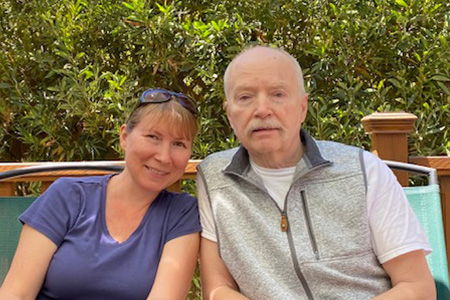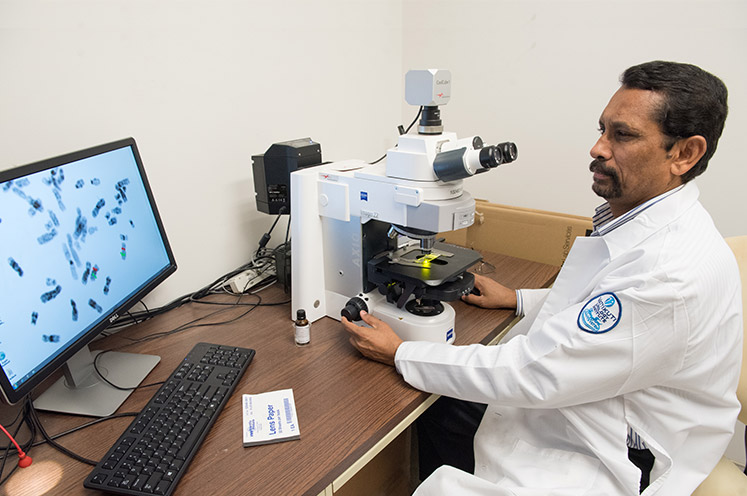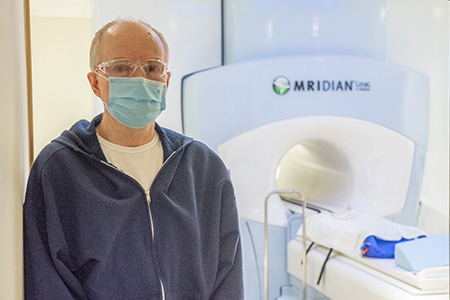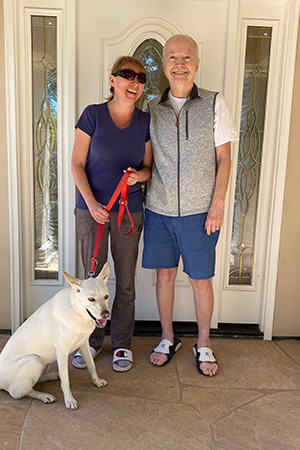Quick diagnosis with rapid results
Your prostate cancer care starts with an accurate diagnosis. At Henry Ford Health, our cancer experts offer a one-stop diagnostic process using state-of-the-art technology with results in less than 48 hours.
 One year after John Low had a prostatectomy, he was frustrated and frightened as he faced a daunting decision: Find the right medical center to treat prostate cancer that recurred. Finally relieved, John flew from California to Michigan to meet Benjamin Movsas, M.D., chair of Henry Ford Health Department of Radiation Oncology and interim medical director of the Henry Ford Cancer Institute to be evaluated for precision treatment using a novel treatment option, MRI-guided radiation therapy.
One year after John Low had a prostatectomy, he was frustrated and frightened as he faced a daunting decision: Find the right medical center to treat prostate cancer that recurred. Finally relieved, John flew from California to Michigan to meet Benjamin Movsas, M.D., chair of Henry Ford Health Department of Radiation Oncology and interim medical director of the Henry Ford Cancer Institute to be evaluated for precision treatment using a novel treatment option, MRI-guided radiation therapy.
John Low is a semi-retired concert promoter for Rocket Radio in the San Francisco Bay area, and he lives in Palo Alto, the global center for innovation and technology. John had a yearly prostate specific antigen test (PSA) to screen for prostate cancer, a disease that his father suffered with.
Your prostate cancer care starts with an accurate diagnosis. At Henry Ford Health, our cancer experts offer a one-stop diagnostic process using state-of-the-art technology with results in less than 48 hours.

In 2018, his PSA test levels were high. Following a biopsy, high-risk prostate cancer was confirmed. His prostate was completely removed, and pathologists reported there were negative margins, meaning no cancer cells were found around the edges of the prostate tissue that had been removed. This suggested that surgeons had removed all the cancer.
However, one year later his PSA levels started to increase and each month it increased from the previous month. Doctors indicated the elevating PSA levels were a confirmation of a cancer recurrence.
“I went into a little bit of a panic mode,” says John.
At a major medical center in San Francisco, John had a highly precise PSMA prostate scan to look for the cancer. Nothing was found, and it was suggested that the scan may have been done prematurely. Within months, though, John’s PSA score increased further.
“I took immediate action,” says John. To reduce the testosterone that feeds prostate cancer, he started androgen deprivation therapy (ADT). However, the therapy can reduce muscular stability and increases the risk of other health issues.
At that time, various radiation experts recommended postoperative radiation. Anxious and undecided, John shifted his attention to research. John learned about the ViewRay MRIdian Linac system – a unique combination of magnetic resonance imaging (MRI) guidance along with precision linear accelerator radiation therapy. Most radiation units utilize CT imaging for guidance, but MRI imaging can improve targeting due to improved soft tissue imaging and real-time tracking during the radiation treatment itself. John contacted several medical centers around the country that were listed on the ViewRay website, then he finally called Henry Ford.
John understood that he could receive radiation treatment closer to home, but he opted to come to Henry Ford for both the expertise of the team and the state-of-the-art technology. Henry Ford was the first center in the world to install the ViewRay MRIdian Linac system at its site in Grosse Pointe Farms. At their new facility in downtown Detroit, the Brigitte Harris Cancer Pavilion, Henry Ford has since installed their second ViewRay MRIdian Linac system. Henry Ford is one of the only institutions in the world to have two of the MRIdian Linac systems.
 Also, Henry Ford is fortunate to have recruited Parag J. Parikh, M.D. from Washington University to lead their MRI-guided radiation program. Dr. Parikh is internationally recognized for his leadership in this area and has implemented a novel program involving MRI-guided adaptive radiation, in which the radiation plan can be modified in real-time based on the MRI imaging and the patient’s anatomy at that moment. Dr. Parikh is leading an international study to apply this approach to pancreatic cancer in only five treatment sessions.
Also, Henry Ford is fortunate to have recruited Parag J. Parikh, M.D. from Washington University to lead their MRI-guided radiation program. Dr. Parikh is internationally recognized for his leadership in this area and has implemented a novel program involving MRI-guided adaptive radiation, in which the radiation plan can be modified in real-time based on the MRI imaging and the patient’s anatomy at that moment. Dr. Parikh is leading an international study to apply this approach to pancreatic cancer in only five treatment sessions.
“This exciting technology can be applied now to almost any cancer in the body and allows us to better deliver effective doses of radiation precisely to the target while minimizing side effects,” says Dr. Parikh, director of MR Guided Radiation Therapy and director of Gastrointestinal Radiation Oncology at Henry Ford. “Conventional radiation for prostate cancer often takes many weeks to deliver, and it’s not able to make daily adjustments based on the position of the bladder, urethra or rectum. MRI-guided radiation is an excellent option for intact prostate cancer, often shortening the treatment to less than two weeks.”
Within days after talking with Dr. Movsas, John was scheduled for radiation therapy, and he rented an Airbnb in Grosse Pointe Farms. At Henry Ford Cottage Hospital, precise MRI images were taken before treatment and, importantly, also during the radiation treatment itself to allow for real time tracking.
“The staff understands their machine,” says John. “They have an elite team, and they know how to implement the treatment and use the equipment that is superior to anything else out there. They know how to take each person and interface their condition with this machine to get the best result.”
Dr. Movsas was part of the on-site radiation team at Henry Ford’s downtown medical center, and he frequently drove to Grosse Pointe Farms to specifically see John during the course of his treatment.
“That’s a lot for a doctor to do,” says John. “Also, when I was nervous about the ADT drug running out, Dr. Movsas swung into action and made several calls and acquired the drug so I could continue without disruption.
“The whole team matched the doctor’s professionalism,” says John. “They became like a family to me. When I had first met Dr. Movsas, he informed me that his staff, his physicist, and his therapists were the best. It turned out that he was absolutely correct,” says John.
On the day before John flew back to California, he had a parting comment for Dr. Movsas, “You’re my hero.” Dr. Movsas replied, “It’s our honor to take care of you.”
 From his home in Palo Alto, John credits his wife Victoria, who is a nurse, for her support. “We watched hundreds of videos to determine the right direction and to get the maximum results with the least amount of side effects. It was a complicated process,” recalls John. He also credits his faith and answers to prayer for leading him to Henry Ford.
From his home in Palo Alto, John credits his wife Victoria, who is a nurse, for her support. “We watched hundreds of videos to determine the right direction and to get the maximum results with the least amount of side effects. It was a complicated process,” recalls John. He also credits his faith and answers to prayer for leading him to Henry Ford.
“You need extra-strength perseverance to go through all this research and find an option,” says John.
One of the most surprising parts of the radiation treatment was the lack of side effects. “I had zero then, and zero now,” says John, as he sat in his West Coast home admiring the serene and hilly area outside.
“Dr. Movsas remotely monitors me for prostate cancer,” says John who will continue to have frequent PSA tests and is also monitored by his local doctors.
John has advice for others seeking cancer treatment: “You have only one life, only one chance. I think it’s absolutely essential to talk with the outstanding and dedicated providers at Henry Ford and at least listen to them before making a decision.”
We use cookies to improve your website experience. By using this site, you agree to our Terms of Use. Read our Internet Privacy Statement to learn what information we collect and how we use it.